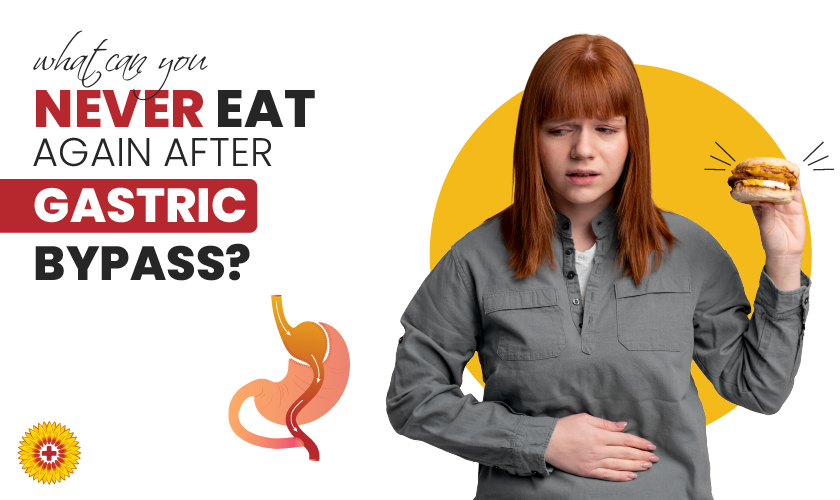Choosing gastric bypass surgery changes lives, especially for those grappling with obesity. It promises impressive weight loss, like a fresh start.
But the real victory happens outside the surgery room – in the kitchen, at the dinner table. What you eat is key for maintaining good health and managing weight for the long haul.
Knowing which foods to steer clear of after gastric bypass surgery is essential for your body’s health and also for your peace of mind.
What Can You Never Eat Again After Gastric Bypass
After an operation, your stomach can hold less food. Some types of food can make you feel unwell, lack the right nutrients, or get in the way of you losing weight. Here’s a breakdown of what should be off your menu:
- High-calorie, Low-nutrient Foods: This kind can bring about “dumping syndrome.” It’s when sweet and high-fat edibles pass too swiftly through your small intestine. You might feel sick, throw up, become dizzy, or sweat.
- Carbonated Beverages: These can stir up gas, cause you to bloat, and bring discomfort to your stomach. Ditch the soda and carbonated water.
- High-Sugar Foods: Foods and drinks high in sugar can lead to dumping syndrome and are counterproductive to weight loss goals.
- Fatty Foods: High-fat foods aren’t easy to digest. These can make you gain weight and pose a risk to your heart.
New Eating Habits and Food Preparation
Your new stomach needs a new eating approach. Smaller, more frequent meals are the way to go. Here’s how to adjust:
- Smaller, More Frequent Meals: Your daily menu should have many small meals, helping you get the nutrients you need without making your new stomach feel overloaded.
- Chewing Food Thoroughly: This aids in averting blockages at the stomach staple line site and enhances digestion.
- Meal Planning: Prioritize filling, healthy foods like vegetables, whole grains, and lean proteins. A well thought-out meal plan will help you stick to a balanced diet, and avoid spur-of-the-moment eating.
The Emotional and Social Aspects of Dietary Changes
Changing your eating habits might be tough, both in mind and spirit. It’s normal to feel alone or upset while organizing gatherings and home dinners.
Creating a helpful circle and identifying optimistic ways to cope with these shifts is key.
Don’t forget, asking for guidance from a therapist or support group to handle these emotions is completely fine.
Conclusion
Life changes after a gastric bypass, even in your kitchen. Though you can’t eat certain foods anymore, eating well-balanced and healthy meals is possible. You’re never alone in this new lifestyle.
Help others understand your journey by sharing it. Connect, ask for help. Just tackle one meal at a time.
Your path may be different, but life can be healthier. Challenges? Yes. But, great rewards follow. There’s more help and people like you out there. Don’t be afraid to reach out.
Together, we can turn this change into a launchpad for a more lively, fuller life.
Contact us today at Urgent Care of Kansas for support and guidance.
FAQs
What can you never eat again after gastric bypass?
- Sugary, high-fat foods.
- Nuts and seeds.
Can I ever eat sugar again after gastric bypass?
While you should avoid high-sugar foods, especially in the early stages of your recovery, you may be able to tolerate small amounts of sugar in your diet over time.
Consult your healthcare provider for personalized advice.
Will I need to take vitamins and supplements?
Indeed, a majority of those who undergo gastric bypass surgery will require vitamins and supplements. This is to keep nutritional shortages at bay. The right ones for you? Your doctor will guide you.
How do I handle social settings?
Think ahead, pack your meal if you need, and feel free to talk about your food choices with your close ones. They’ll most likely get it and back your wellness objectives.
Gastric bypass before and after – what do I expect?
Prior to your operation, expect some assessments and maybe a diet to prepare. Post-surgery, there’s a rigorous diet to follow. It starts with liquids, slowly moving to solid foods. A noticeable drop in your weight is probable.
Will I have gastric bypass scars after surgery?
Yes, after gastric bypass surgery, small scars might appear. But, they’re not usually big and can even become less noticeable as time passes. Surgeons often use a technique called laparoscopy. This means they make smaller cuts.
What is a gastric bypass alternative?
Other choices for losing weight include surgery options like the sleeve gastrectomy, adjustable gastric band, and non-surgical options like taking medicine or changing your lifestyle through diet and exercise.
Is gastric bypass reversible?
Yes, technically you can reverse it. But, it’s a tough process and not carried out very often. We think of it as permanent. Going backwards brings risky and difficult challenges.



No comment